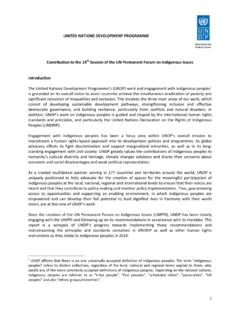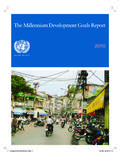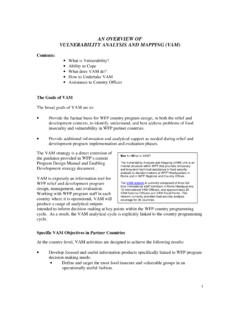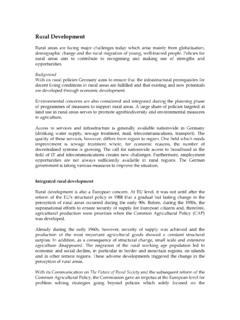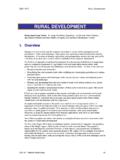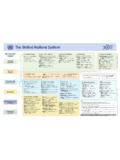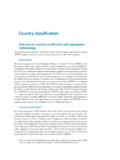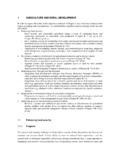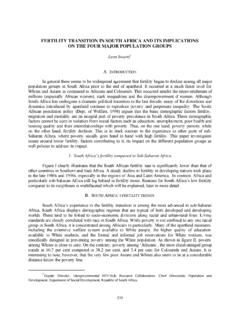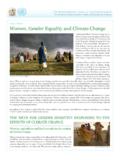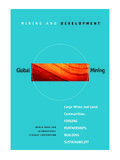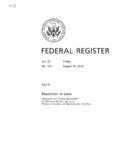Transcription of Promoting Empowerment of People in achieving …
1 ONLINE SURVEY ONPromoting Empowerment of People in achieving poverty eradication, social integration and full employment integration and full employment and decent work for all. united nations department of Economic and Social Affairs Division for Social Policy and Development 2 DESAThe department of Economic and Social Affairs (DESA) of the united nations Secretariat is a vital interface between global policies in the economic, social and environmental spheres and national action. The department works in three main interlinked areas: (i) it compiles, generates and analyses a wide range of economic, social and environmental data and information on which Member States of the united nations draw to review common problems and take stock of policy options; (ii) it facilitates the negotiations of Member States in many intergovernmental bodies on joint courses of action to address ongoing or emerging global challenges; and (iii) it advises inter-ested Governments on the ways and means of translating policy principles developed at united nations conferences and summits into programmatic frameworks at the country level and.
2 Through technical assistance, it helps build national Division for Social Policy and Development (DSPD) is part of the department of Economic and Social Affairs (DESA) of the united nations Secretariat. The Division seeks to strengthen international cooperation for social development, particularly in the areas of poverty eradication, productive employment and decent work and the social inclusion of older persons, youth, family, persons with disabilities, Indigenous Peoples, persons in situations of conflict and other groups or persons marginalized from society and views expressed in the present report are those of the authors and do not imply the expression of any opinion on the part of the Secretariat of the united nations , particularly concerning the legal status of any country, territory, city or area or of its authorities, or concerning the delimita-tion of its frontiers or boundaries.
3 The term country as used in the text of this report also refers, as appropriate, to territories or areas. Mention of the names of firms and commercial products does not imply the endorsement of the united nations . 3 AcknowledgmentThe responses collected from the online survey on People s Empowerment contained in this report represent a collaborative effort, made possible by the answers received from People across the world on the theme of Empowerment . Their invaluable contributions were essential for the prepa-ration of this Division for Social Policy and Development (DSPD) of the united nations department of Economic and Social Affairs (UNDESA) was glad to receive tens and tens of responses from young individuals; persons with disabilities, older persons and People working for various institu-tions and organizations committed to social development issues.
4 Their keen interest on Empower-ment reminded us about the growing importance of this topic in our the responses were precious; they provided a unique overview of how Empowerment can help achieve poverty eradication, social integration and full employment and decent work for People with different origins, cultures and languages. The Division for Social Policy and Development is grateful for the many contributions received, which enabled readers of the Empowerment survey, to share and learn from their experiences and beliefs. Thank you to all of you for making this possible!4 Introduction The Division for Social Policy and Development (DSPD) of the united nations department of Economic and Social Affairs (UN-DESA), from 8 August to 5 September 2012, conducted a global online survey to gather inputs for consideration by the 51st session of the Commission for Social Development (CSocD)
5 , which took place from 6 to 15 February survey enabled the public worldwide to respond to a set of questions that were related to the priority theme of CSocD on " Promoting Empowerment of People in achieving poverty eradica-tion, social integration and full employment and decent work for all .The responses collected and selected from the first question " Empowerment : What does it mean to you?" was published in a separate ten questions were the following:1. When you hear the term " Empowerment " what does it mean to you?2. How would empowering People help achieve poverty eradication? 3. How would empowering People improve social integration, especially of People living in poverty, youth, older persons, persons with disabilities and indigenous peoples?
6 4. How could empowering People help achieve full employment and decent work? 5. What do you consider would be main barriers to the economic, social and political empower-ment of People and social groups including People living in poverty, youth, older persons, persons with disabilities and indigenous People ? 6. Do you have any examples of successful Empowerment of People , including specific social groups? Please indicate them. 7. What policies do you consider would further promote social, economic, political and legal Empowerment of People , including social groups? 8. Do you consider that Information and Communication Technologies (ICTs), especially the Internet has an impact on Empowerment ? Can you give some examples?
7 9. How is Empowerment related to inequality in societies? 10. Please provide any additional Table of ContentsHow would empowering People help achieve poverty eradication?..6 How would empowering People improve social integration, especially of People living in poverty, youth, older persons, persons with disabilities and indigenous peoples?.. could empowering People help achieve full employment and decent work?..49 What do you consider would be main barriers to the economic, social and political Empowerment of People and social groups including People living in poverty, youth, older persons, persons with disabilities and Indigenous Peoples?
8 69Do you have any examples of successful Empowerment of People , including specific social groups? Please indicate policies do you consider would further promote social, economic, political and legal Empowerment of People , including social groups?..114Do you consider that Information and Communication Technologies (ICTs), especially the Inter-net has an impact on Empowerment ? Can you give some examples?..132 How is Empowerment related to inequality in societies?..152 Please provide any additional comments?..167 How would empowering People help achieve poverty eradication? Certain liberties exercised by the state and other ruling elites (private sector/commercial interests), that have an exploitation impact would be curtailed when decision-making regarding use of local resources is owned at the local level.
9 This in turn would mean that leverage or negotiation power is equalized and thus resource sharing equalized. Hence poverty reduction would hopefully ensue. Empowering People by giving them a good education that will prepare them to have a carrier and to hold a job that will make them more confident, give them the chance to learn from others, allow them to earn a good living to help their children to live a better life. We had a few years back a symposium in India where we asked experts whether poverty was eradicable in India. The answer: "Very much eradicable. We could have eradicated it long time back. We had the resources." What then was missing? The answer by them: the political will.
10 What was to be this political will? It is supposed to be power-linked determination. The crux of the problem: those who have (political) power do not have hunger and those who have hunger do not have power. Hence poverty gets a backseat as a problem to address urgently. If power comes to those who have hunger, poverty eradication will be on war footing basis. And what is power? We gave our own simple description: to have power is to have an effective say and to have a say we need forums. Hence Empowerment and poverty eradication will not happen unless adequate steps are taken to ensure that the required inclusive, small-sized, neighborhood-based multi-tiered forums as mentioned above are in place.
